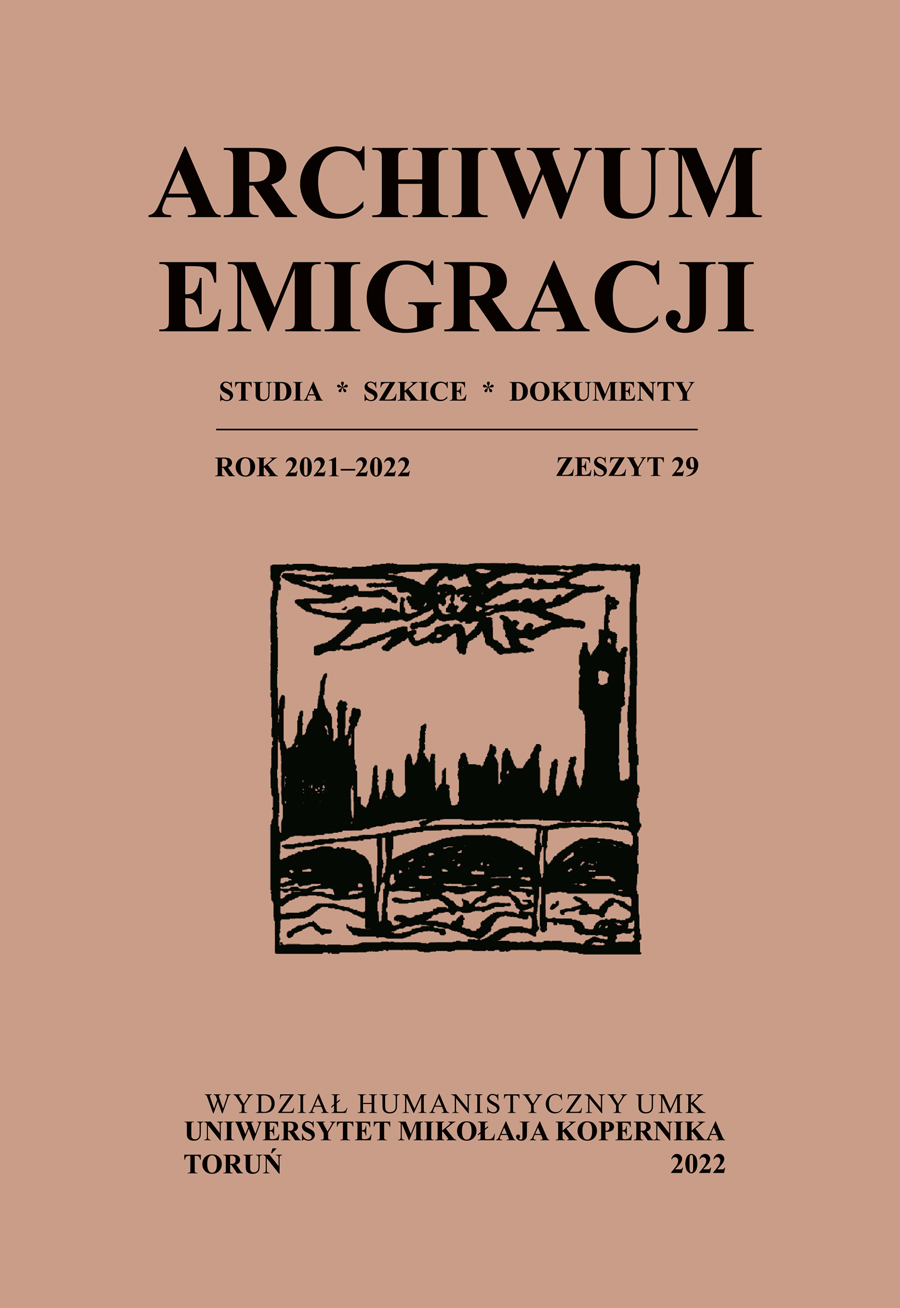Zygmunt Lubicz-Zaleski (1882–1967) and his contribution to the development of the Polish Library in Paris
DOI:
https://doi.org/10.12775/AE.2021-22.018Keywords
Zygmunt Lubicz-Zaleski, emigration, Polish Library in Paris, education, training, French-Polish co-operationAbstract
On the basis of research in the rich archives of the Polish Library in Paris (12 volumes of Professor Zygmunt Zaleski’s private and official correspondence, manuscripts and articles), the author presents the most important aspects of his activity in Paris. The Polish Library in Paris, a symbolic place for the Poles living in exile, became of utmost significance for Zaleski as it allowed him to develop co-operation not only with Polish institutions (mainly with the Polish School, the Polonia periodical, the Polish Artists’ Association, Kazimierz Woźnicki’s French-Polish Committee) but also French institutions: the School for Advanced Studies in the Social Sciences (EHESS), the National Institute for Oriental Languages and Civilisations (Langues O’) and the Institute for Slavonic Studies (IES), where he initiated close co-operation with the Polish Library. The cultural exchange between Polish and French institutions became official when Lubicz-Zaleski was nominated a delegate of the Polish Ministry of Religious Affairs and Public Education. The Polish Library was then transformed into a scientific institution with a status of a university for Polish and French students. The outbreak of the war put an end to this golden period in the history of the Polish Library. After the turbulences during the war period (work in the free zone of Villard de Lens, detention centre, Buchenwald concentration camp) Zaleski resumed his duties as a delegate for the ministry of Science and Higher Education (now under the aegis of the Polish government-in-exile based in London) and the secretary general for the Polish Historical and Literary Society.
References
Bibliothèque polonaise de Paris, Archives de Z. Lubicz-Zaleski, Akc. 3862/1-2; Akc. 3847/1.a.
A. L. [Anna Lipa], Towarzystwo Historyczno-Literackie i Biblioteka Polska w Paryżu; Zarys historii, Wiesława Kordaczuk, Elżbieta Kosieradzka, Ewa Rutkowska (dir.).
Bobrowska-Jakubowski E., Le milieu des artistes polonais en France 1890–1918. Communautés et individualités; thèse de doctorat, Université Paris 1 Panthéon–Sorbonne, 2001, s. 128.
Chlebowski B., La littérature polonaise au XIXe siècle, 1933.
Delaperrière M., « Autour de Paul Cazin, les relations culturelles entre la France et La Pologne au XXe siècle », [in :] Paul Cazin, Colloque international, Francis Claudon, Anna Nawrocka, dir., Autun-Dijon 1997.
–, « Stratégie politique et culturelle dans l’émigration polonaise (1914–1918) », Zeszyty Naukowe Uniwersytetu Jagiellońskiego, Prace Historyczne, n° 85 ; série Studia Gallo-Polonica, UJ, PWN, 1988, n° 1.
« Entretien sur Władysław Mickiewicz » de B. Borkowska avec E. Rutkowska à l’occasion de l’exposition qui lui a été consacrée par la Société Historique et Littéraire Polonaise, [in :] Bulletin d’information et de contact entre les membres de la SHLP, n° 18, novembre 2008.
Grappin H., « Polonais » in Cent-cinquantenaire de l’École nationale des Langues Orientales Vivantes, Paris, 1948.
H. D. « Stosunki naukowe Polski z zagranicą », Nauka Polska 1925.
Jaczewski B., « Działalność polskiego przedstawiciela, naukowego we Francji w okresie międzywojennym », Kwartalnik Historii Nauki i Techniki 1975 (XX), n° 2.
Jarosz D., M. Pasztor, « Rola sporu o Bibliotekę Polską w Paryżu w stosunkach polsko- francuskich w latach 1945–1980 », [in:] Z Badań nad Książką i Księgozbiorami Historycznymi, Varsovie 2006, t. 1.
Klatka U. et alii., Archiwum Zygmunt Lubicz-Zaleskiego w zbiorach Biblioteki Polskiej w Paryżu, Kraków 2011.
Kłossowski A., Ambasador książki polskiej w Paryżu, Władysław Mickiewicz, Wrocław 1971.
Konopczyński W., Liberum veto, 1930.
Lubicz-Zaleski Z., Dziennik nieciągły (1904–1925), Paryż–Łódź 1998.
–, et M. Noir, L’Effort vital de la Pologne contemporaine, Paris, s.d.: préface Charles Richet.
–, « La psychologie du voyage et la vocation de comparatiste », [in :] Connaissance de l’étranger. Mélanges offerts à la mémoire de Jean-Marie Carré, H. Peyre (dir.) Paris 1964.
Mazon A., « Władysław Mickiewicz », note nécrologique, Revue des études slaves 1926 n° 6, 1–2.
Paul Cazin, diariste, épistolier, traducteur, D. Knysz-Tomaszewska (dir.), Varsovie 1997.
La Pologne en France. Essai d’une bibliographie raisonnée, t. 1 : Littérature, Théâtre, Beaux-Arts, 1935 ; t. 2 Encyclopédies. Langue, Voyages. Histoire, 1938 ; t. 3 Géographie, Sciences, droit, suppléments, publication posthume en 1941.
Prokop M., « Paul Cazin à la Bibliothèque polonaise », [in :] Paul Cazin, Colloque international, Francis Claudon, Anna Nawrocka, dir., Autun–Dijon 1997.
Pugacewicz I. H., Batignolles 1842–1874. Edukacja Wielkiej Emigracji, Warszawa 2017.
Rederowa D., „Polska Stacja Naukowa w Paryżu (1893–1926)”, [in :] D. Rederowa, B. Jaczewski, W. Robielski, Polska Stacja Naukowa w Paryżu w latach 1893–1926, Wrocław, Varsovie, Cracovie, Gdańsk, Łódź 1982.
Rutkowski J., Histoire économique de l’ancienne Pologne, 1929.
Śladkowski W., Emigracja polska we Francji 1871–1918, Lublin 1980.
Towarzystwo Historyczno-Literackie i Biblioteka Polska w Paryżu; Zarys historii i prezentacja zbiorów, Wiesława Kordaczuk, Elżbieta Kosieradzka, Ewa Rutkowska (dir.), Paryż–Warszawa 2014.
Downloads
Published
How to Cite
Issue
Section
License

This work is licensed under a Creative Commons Attribution-NoDerivatives 4.0 International License.
Stats
Number of views and downloads: 612
Number of citations: 0



